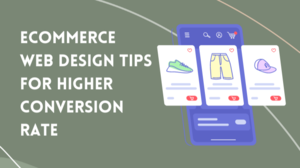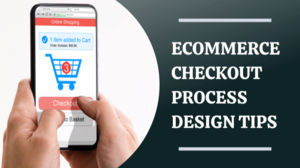The 8 Best Shopify Alternatives for Small Businesses (Stop Paying High Fees!)
When you're running a small business, every dollar matters.
Otherwise, high ecommerce fees can quickly eat into your profits.
Shopify is hands down a great platform, but it's not always the most budget-friendly choice, especially when you add transaction fees, app costs, and paid themes.
But the good news is, there are plenty of powerful Shopify alternatives for small businesses that offer the tools you need without the hefty price tag. In this guide, we will explore some of the best options that help you sell online, stay flexible, and keep more money in your pocket.
Here's an overview of 8 of the Shopify alternatives for small businesses:
- Square Online – Offers the best free plan and easy POS integration.
- WebCommander – Easy setup with strong local support.
- PrestaShop – Free and highly customisable.
- Shift4Shop – Fully hosted with many built-in tools.
- BigCommerce – No extra transaction fees and scalable features.
- Wix – Drag-and-drop builder that's perfect for small shops starting fast.
- WooCommerce – Perfect for small businesses already using WordPress.
- Squarespace – Simple and perfect for small brands that want beautiful storefronts.
1. Square Online
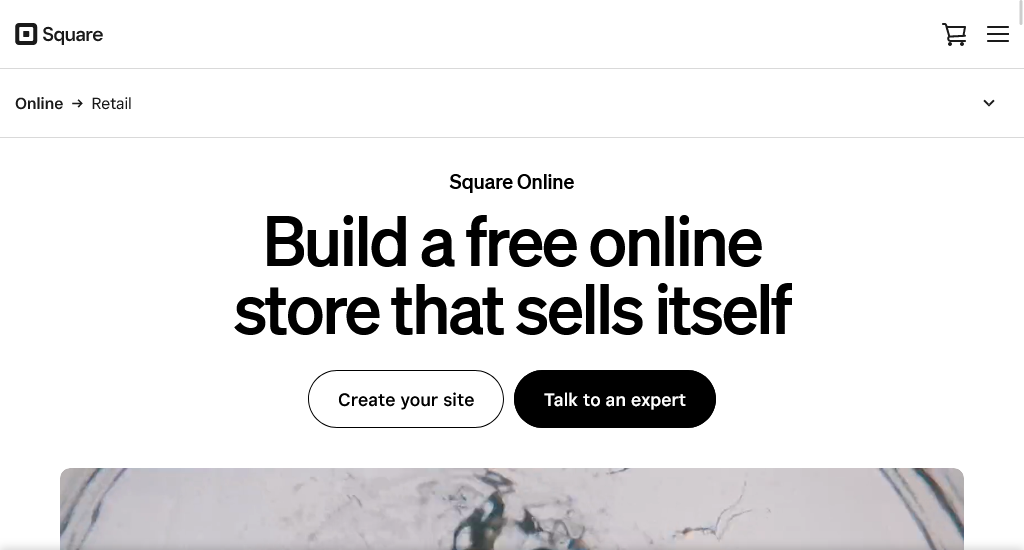
Pros
- It offers a forever-free plan. This makes it ideal for beginners and small businesses.
- It is ideal for stores selling both online and in person, as it integrates smoothly with its POS system.
- The setup is very easy. All it requires is a simple dashboard to manage products and orders.
- All the themes are mobile-friendly.
Cons
- There is limited design freedom and fewer templates.
- Customer support may not be as strong for complex online stores.
Pricing
Square provides a range of plans. It starts from $0/month for basic features, $40/month for advanced business tools, and custom pricing for businesses processing over $250 per year, with all plans subject to processing fees.
2. BigCommerce
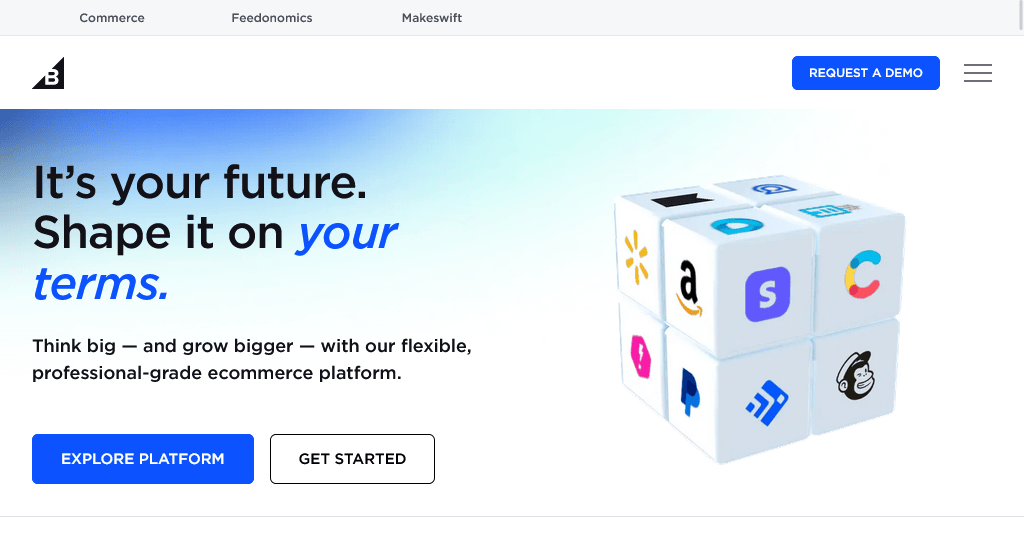
Pros
- There is no transaction fee, which helps small businesses to save money as sales volume grows.
- It is highly scalable and supports large catalogues and multi-store setups.
- It comes with strong SEO, reporting, and analytics features.
- It offers robust APIs and advanced tools that are suitable for growing businesses.
Cons
- The monthly pricing can get higher, especially at advanced levels.
- It is more complex to learn compared to simple drag-and-drop builders.
Pricing
The Enterprise of BigCommerce provide custom pricing and advanced features.
3. Wix
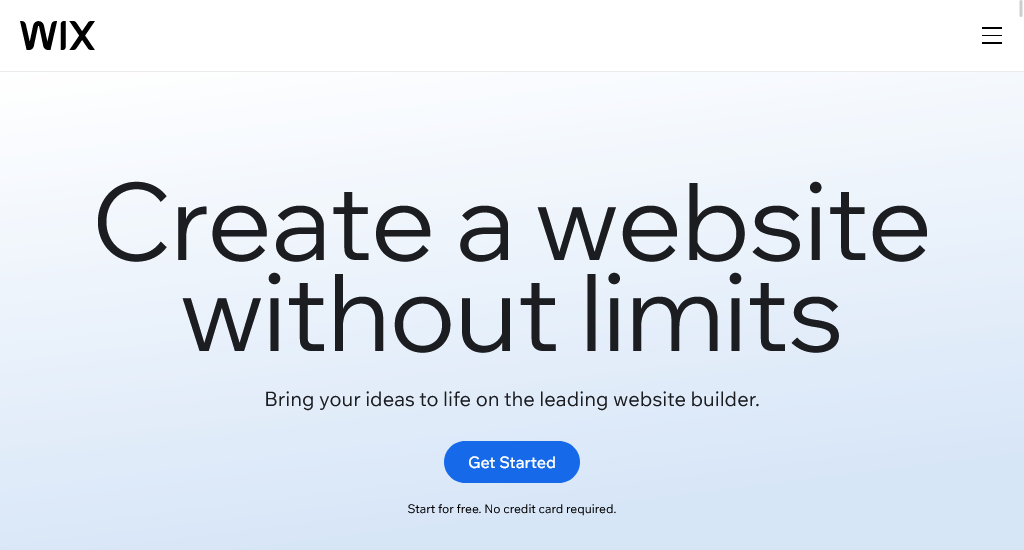
Pros
- Due to its drag-and-drop builder, it turns extremely beginner-friendly.
- It offers affordable pricing alongside hundreds of modern, visually strong templates.
- It is perfect for small stores that want to launch quickly with minimum setup.
- It includes built-in tools like blogging, bookings, and marketing features.
Cons
- It is not ideal for large inventories or businesses that have a plan for major growth.
- It lacks advanced ecommerce features available on more specialised platforms.
Pricing
Wix's eCommerce pricing in Australia includes the Light plan at AU$21/month, the Core plan at AU$42/month, the Business plan at AU$55/month, and the Business Elite plan at AU$199/month.
4. WebCommander
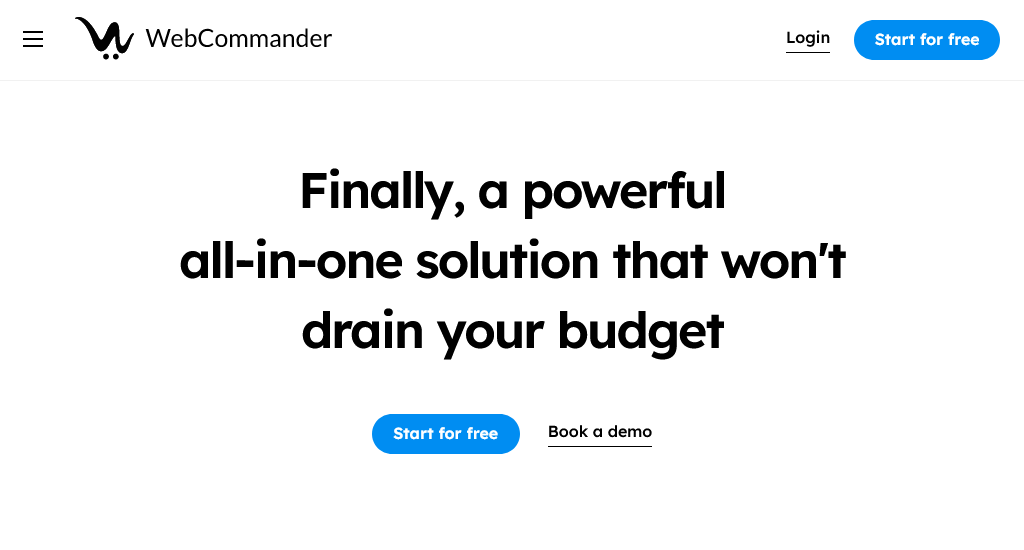
Pros
- It includes built-in automation to minimise repetitive tasks while improving workflow.
- You will be less dependent on third-party add-ons, as there are many features.
- It is scalable enough to support multiple stores, customer groups, or locations.
- It offers a flexible design system to ensure fast performance.
Cons
- The absolute beginners can find the extensive features pretty overwhelming.
- There are fewer tutorials or user-generated resources.
Pricing
WebCommander provides flexible pricing options for businesses of all sizes. You can start with a free Startup plan for beginners, a Professional plan at AUD $15/month for growing businesses, a Premium plan at AUD $350/month for high-volume sellers, and custom Enterprise solutions tailored for complex business needs.
5. PrestaShop
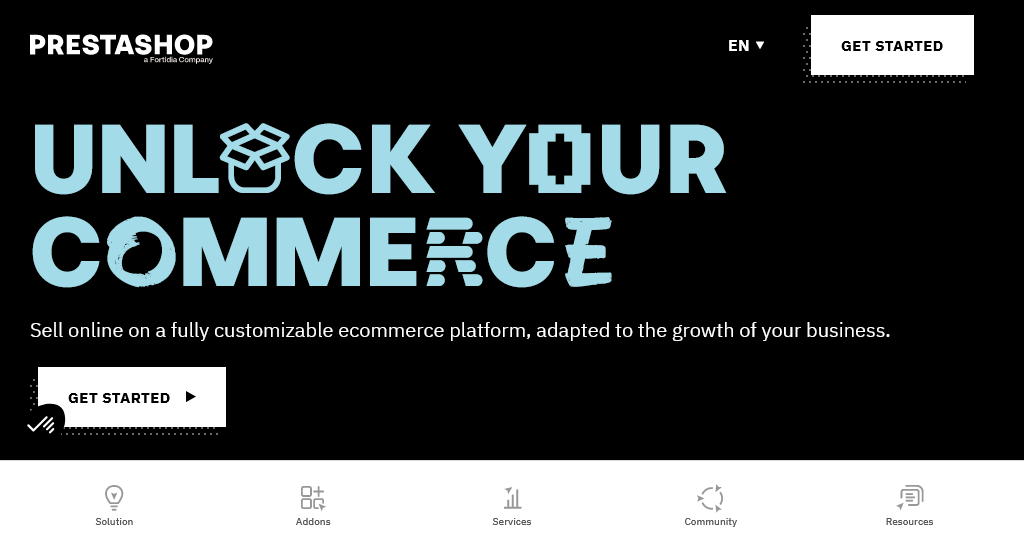
Pros
- It is completely free and open-source and offers deep customisation options as well.
- It has a large library of add-ons that allow you to expand functionality as you grow.
- It provides strong SEO capabilities with control over URLs, metadata, and multi-language support.
- Being self-hosted gives you full control over performance and store structure.
Cons
- Many important features require paid add-ons, which can increase the overall cost.
- It provides limited official support.
Pricing
PrestaShop offers three plans. The Classic plan is a free self-hosted option to set up your store. Then comes Hosted, which starts at €24/month with hosting, support, and ecommerce services included and the Enterprise plan that starts at €2,115/month for a fully customisable, high-performance platform.
6. Shift4Shop

Pros
- It is fully hosted with a rich set of built-in ecommerce tools such as SEO, CRM, and marketing.
- There is a free or low-cost plan for users who choose the native payment processor.
- It allows unlimited product listings and bandwidth for the premium plans.
- There is a reliable backend with continuous support available.
Cons
- The design editor looks and feels a bit outdated compared to modern builders.
- To avail the free plan, one needs to use the platform's payment system.
Pricing
Shift4Shop offers an unlimited, enterprise-grade plan for just $41/month, while other platforms charge up to $299/month for standard plans and over $2,000/month for enterprise plans.
7. Squarespace
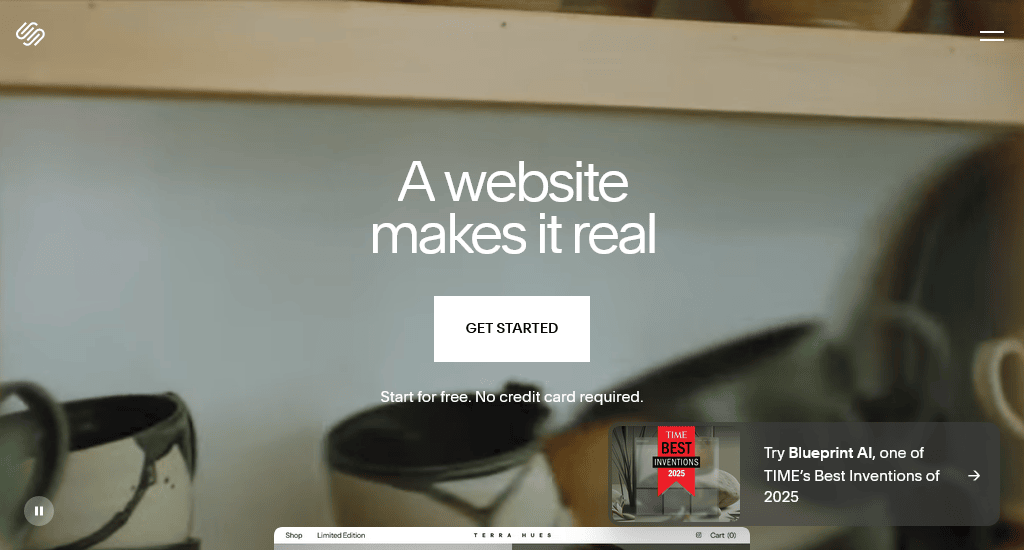
Pros
- It is popularly known for its stunning templates that suit creative and brand-focused stores.
- The all-in-one platform offers everything, including hosting, domain management, and design tools.
- The platform is great for content-rich businesses that combine blogs, portfolios, and ecommerce.
- It has strong reliability, security, and built-in SEO tools.
Cons
- The platform has transaction limitations depending on your plan.
- It offers fewer third-party integrations compared to open-source platforms.
Pricing
Squarespace offers tiered pricing for Australian users, starting at A$17/month for the Basic plan, A$28/month for the Core plan, A$49/month for the Plus plan, and A$109/month for the Advanced plan.
8. WooCommerce
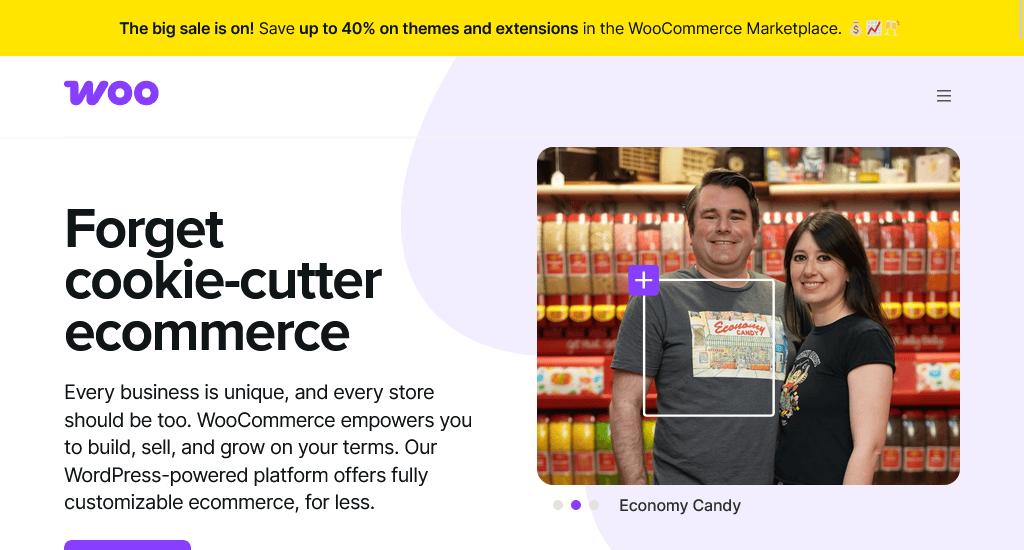
Pros
- It turns WordPress into a powerful ecommerce system with high flexibility.
- There is a huge range of plugins and themes to customise your store.
- As it is self-hosted, it gives you complete ownership of your data and performance settings.
- It provides excellent SEO advantages with its WordPress tools.
Cons
- Users have to manage hosting, security, backups, and updates by themselves.
- It can be challenging for non-technical users to maintain.
Pricing
WooCommerce is free to install and use, but you'll need to budget for additional expenses you need to add.
8 Common obstacles that small businesses face with ecommerce
1. Finding the right ecommerce platform
Most small businesses struggle to choose a platform considering their budget, technical skills, and growth goals.
2. Limited marketing budget
When they don't have enough budget for ads and SEO, it gets hard to compete with bigger brands.
3. Managing inventory
Keeping the right stock levels, avoiding overselling, and handling supplier delays becomes very difficult, especially when starting out.
4. Website speed and performance issues
Slow or poorly designed websites cause visitors to leave quickly, leading to fewer sales.
5. Complicated checkout experience
The long or confusing checkout processes end up enhancing cart abandonment.
6. Building customer trust
New small online stores often struggle to earn trust as they lack reviews, strong branding, or social proof.
7. Handling returns and refunds
Small businesses may not have streamlined processes for returns, making it time-consuming and costly.
8. Customer service overload
Responding to messages, managing complaints, and supporting customers across multiple channels can often drain time.
8 Features to look for in an ecommerce platform
Here are 8 key features small businesses should look for in an ecommerce platform:
- Small businesses should look for an ecommerce platform that is easy to use, so they can manage products, orders, and pages without needing technical skills.
- It's important to go for a platform that offers secure and flexible payment options to give customers confidence at checkout.
- Reliable inventory management helps businesses track stock accurately without overselling.
- Mobile-friendly design ensures customers have a smooth shopping experience on any device.
- Strong SEO tools help small businesses improve visibility and attract more organic traffic.
- Integrated marketing features like email tools, discount codes, and abandoned cart recovery support ongoing growth.
- Affordable and transparent pricing allows small businesses to scale without extra costs.
- Good customer support ensures quick help when issues arise, keeping the store running smoothly.
Conclusion
So, even though Shopify is popular, there are several alternatives for small business owners that offer lower fees, greater flexibility, and features tailored to your needs. Explore these options, and see whether they fit your budget. Take enough time to compare features, pricing, and ease of use — the right choice will set your business up for success.




![How to Start an Ecommerce Business in Australia [2023 Guide]](/template/e27cf56f/images/resource-blog-right-img1.png)
